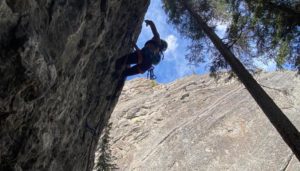Ross Edgley on Long British Swim Expedition

Edgley left Margate, Britain, on June 1 and over the past 80-plus days has been swimming around the country.
He’s past jellyfish and the salt water is disintegrating parts of his tongue, but beyond those issues everything has gone smoothly.
“Wildlife is always a danger when you’re isolated in the sea. Giant jellyfish are a particular worry,” Edgley said.
“I won’t shave. Because you’re leading with the head and the face will be most exposed, any protection, like a big beard, will help. I’ll try and grow it so by the time I get up to Scotland it’s fairly rugged. I’ll also encounter sea otters, dolphins and killer whales along the way, which I’m actually looking forward to. It’ll help break things up for me and be an incredible privilege to see.”
It’s the equivalent of swimming the English Channel every day. “But I know my body can take it; I know I can be the first person in history to achieve it,” he said.
When complete, he’ll have swam 3,2220 kilometres on the expedition, which is known as a ‘contiguous stage sea swim.’
So far, he’s swam about 20 kilometres/day and travelled about 1,600 kilometres.
“I feel an immense sense of pride,” he said last week. “it’s obviously no easy feat! Scotland represented such an important point. It meant we stood a chance of getting round John O’Groats [the northern tip of Britain], and back down the other side before winter really kicks in.”
You can follow along on his site here and on Instagram below.
“To do this sort of challenge I need the ability to swim 50km day and night, powering through 10ft waves,” he said.
“But if the currents are against me I have no chance. The GB rowing challenge, which follows the same route, is labelled as the world’s toughest rowing race on account of the tides, unpredictability and weather. It also follows roughly the same route I will be on. When I told its organisers I’d be swimming it they told me I was crazy.
‘“If you get it wrong around The Highlands you’ve eight knots coming against you,” they said.
‘”So even if you are swimming two to three knots, an Olympic level, you’ll still be going back four knots.” It’s basically going to be a game of chess with Mother Nature – you can swim hard, but you need to swim smart.”‘


